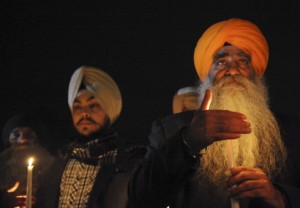
Guest blogged by Herpreet Kaur Grewal
Editorial note:Â the author talked to her colleagues on the Sikh Feminist Research Institute’s editorial board about why they are feminists. This blog post collects their views to mark the Sikh festival of Vaisakhi, which took place this weekend.
When you hear the words ‘Sikh feminist’ what images does it bring to mind? Perhaps it evokes a general image of Asian women holding placards and angrily protesting? Or maybe it reminds one of a grand warrior saint like Mai Bhago riding her horse into battle? Or possibly a more contemporary incident comes to mind, like the one of Balpreet Kaur who last year deflected taunts from an Internet troll by eloquently explaining why she decides to keep her facial hair in a society where women are largely pressured to be perfectly formed and hairless. Or maybe it evokes none of these images.
As editorial board members of a Sikh feminist body we feel compelled to express our philosophy as a proactive and empowered one. All of us look to the Sikh (and non-Sikh) values of equality, honesty and strength (among many others), to anchor our lives in an everyday spirituality. But that doesn’t mean our motivation has always rooted from a positive place.
One of us was sexually assaulted which absolutely shattered a personal notion that being strong, assertive and smart can keep you insulated from an attack. If anything, it laid bare the vulnerability that exists if you happen to be born a woman in a world that can devalue one so extremely and how that devaluation is integrated into the culture and system we live with. A culture and system which many men and women internalise – sometimes, to a massive extent.
Co-blogged by Sundari and The Sikh Love Stories Project
Each year, International Women’s Day is celebrated to honor women’s economic, political and social achievements. As individuals around the world celebrate this day – in both big ways and small – I am left to consider how we can work to honor the achievements of Sikh women not only today but on an ongoing basis.  Sikh women have contributed in such meaningful ways, and yet much of that dialogue is often missing from our history.
In this post, we will be sharing some images with you and discuss various ways Sikh women have been witness to and engaged in our history both locally and globally.  We know this post will not be comprehensive – there is much to unearth about Sikh women’s contributions – but we hope it’s a starting point that will encourage us to keep this valuable history in our minds. Many of the following images each depict a different element of Sikh women in history.
Stories often begin with immigration and this first image shows Sikh women pioneers in Canada who were part of an immigrant labor force recruited in the early years of the twentieth century.
Mill Town Pioneers. Most of Canada’s early Sikh immigrants found work in lumber mills throughout the Pacific Northwest.
Canada’s largest mill community, Fraser Mills in New Westminster, BC, had between 200 and 300 Sikhs living and working there in 1925.
In this photograph from that period, three Sikh women stand in front of company houses at the mill. [link]
One of them wears a traditional embroidered shawl called ‘phulkari’. The phulkari played an important role in the lifecycle rituals of women in Punjabi villages at times of birth, marriage and death.
Guest blogged: Mewa Singh
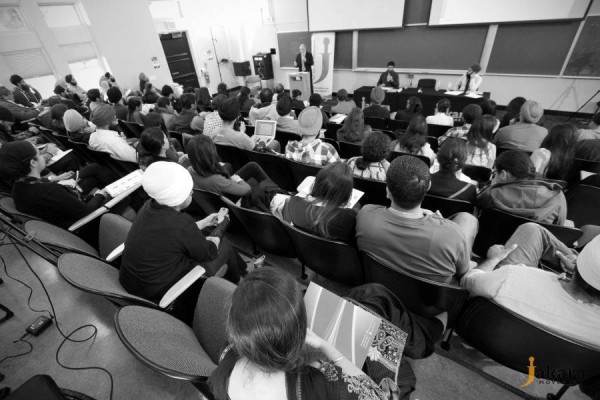 From February 16-17, 2013, researchers from throughout the world, focusing on Sikh-related topics, came together at Stanford University for the 4th annual Sikholars Conference, hosted by the Jakara Movement. From Europe to Pakistan, from India to Canada, and throughout the United States, young scholars came together for a weekend of discussion and engagement in a unique forum that connects the academy to the community. Here, I provide here a bit of a recap and encouragement for those that missed this year to make sure you don’t miss Sikholars 2014.
From February 16-17, 2013, researchers from throughout the world, focusing on Sikh-related topics, came together at Stanford University for the 4th annual Sikholars Conference, hosted by the Jakara Movement. From Europe to Pakistan, from India to Canada, and throughout the United States, young scholars came together for a weekend of discussion and engagement in a unique forum that connects the academy to the community. Here, I provide here a bit of a recap and encouragement for those that missed this year to make sure you don’t miss Sikholars 2014.
The conference commenced with an opening address by Professor Thomas Blom Hansen. The director of Stanford University’s Center for South Asia welcomed the audience and shared his excitement for a new partnership between the Jakara Movement and the Center for South Asia in years to come in hosting the Sikholars Conference.  Next followed a lecture by Professor Linda Hess, one of the world’s foremost authorities on Bhagat Kabir Ji.

“The bodies of Shindiver Grover, 52, his wife Damanjit, 47, and their two sons, Sartag, 12 and Gurtej, 5, were found in their first-floor apartment in Johns Creek, Ga., at around 11:30 a.m. Monday, according to local reports.”
(Source: NY Daily News. Photo credit: CBS Atlanta)
Tragic news broke today that a Sikh family in Atlanta, Georgia, was found dead in their home. The bodies of father Shindiver Grover (52), mother Damanjit Grover (47) and their two sons, Sartaj (12), and Gurtej (5), were discovered in their apartment when Damanjit did not report for work on Monday.
Police are still investigating what is called a “complicated” crime scene, but believe it was a murder-suicide:
The nature of the murder – the city’s first since it was incorporated in 2006 – was troubling to even the most senior investigators, [Johns Creek police Chief Ed Densmore] said.
“We are all human. We’re all parents. We have families,” Densmore said, according to local CBS News.
“You deal with something like this, it will take a little bit out of you, of course.”
Few details have been released at this point. Prayers for the departed souls and condolences are offered to those who knew the family.
While we are still learning about the tragedy, Sikhs in the United States who are seeking resources to deal with domestic issues can contact the Sikh Family Center, who provides a confidential “culturally specific peer-counseling and non-emergency support for community members in Punjabi and English.” The Sikh Family Center message line can be reached at (408) 800-SEVA or (408) 800-7382.
For more immediate needs, the National Domestic Violence Hotline is available in 170 languages at 1−800−799−SAFE (7233). In case of emergency, always first call 911.
[Cross-posted on American Turban]
Guest blogged by Santbir Singh
I try to imagine the government coming to my house one morning and taking my five year old daughter and eight year old son away to a boarding school hundreds of kilometres away. I try to imagine that at this school, my children’s hair will be cut, their dastars and kakkars will be removed and they will be forcibly baptized as Christians. I try to imagine that they will be beaten for speaking Panjabi, reading Bani or trying to maintain their religious and cultural traditions. I try to imagine that even their basic health needs will not be looked after and they may well die from treatable infections and diseases. And then, I must admit, I am not able to imagine the rest; I can not bear to imagine them being abused, assaulted, beaten and raped.
That is what occurred in this country for one hundred years as the Canadian government, along with government sanctioned church groups, kidnapped First Nations children from their homes and took them to residential schools where unspeakable horrors were committed on them. Of course the history of colonization in the Americas does not begin with the Residential School system but is in fact a legacy going back centuries. It is estimated that 90 to 95% of all indigenous people living in the Americas were killed by smallpox within the first century after European first contact in the late 1400’s. It is difficult to fathom death at that scale. Those that remained had their land stolen and were forced onto reservations to live as non-citizens in their own lands.
As a nation, Sikhs are extremely proud of our own anti-colonial struggle against the British. Yet we have completely failed to acknowledge that in Canada we have succeeded due to the colonial oppression of other nations. This land where we build our homes and businesses was the land of nations that lived here for tens of thousands of years. Yes, one hundred and seventy years ago the British annexed Panjab and ended Khalsa Raj. But the British did not exile us from our own villages and towns. The British did not take our land and build new cities. The British did not migrate to Panjab and force us to live on inadequate reserves.
Guest blogged by Gunita Kaur Singh
Being a nonconformist builds character, but only when it is exercised within a certain framework of values. A prime example of this lifestyle is embodied within the Sikh religion.
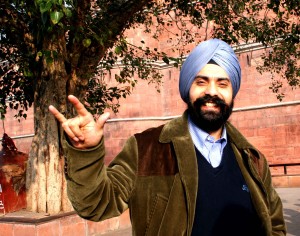
Gunita’s father
Sikhism is very progressive for it allows the practitioner freedom from dogmatism, hence distinguishing it from other religions. However, it is encouraged to use said freedom for the purpose of enhancing a Sikh’s devotion to God and truthful living.
Guru Nanak was a definite nonconformist during his time because he spoke out against the subjugation of women to men, the anthropocentric concept of God, and the prominence of ritualism. The release from these binding ideals gives a Sikh the freedom to live her life as she wishes; even in simply viewing God as the universe itself, a Sikh must still appreciate and value God, but she has the ability to do so in the manner which is most personal and ideal for her mindset. This is the best example to depict nonconformity within a values framework.
Alan Keightley had said, “Once in a while it really hits people that they don’t have to experience the world in the way they have been told to.”
Nanak realized this because a central idea which he would teach seekers of his knowledge was that we belong to nobody, and nobody belongs to us. This notion helps to emancipate individuals from the confinement of bodies, and transcend into spirit form. It also tells us that we never have to be marginalized to institutions or authoritarians.
In a recent piece on BBC Radio 4, titled Beyond Belief – Women in Sikhism, host Ernie Rea starts off with this statement,
“The Sikh religion is the world’s fifth largest… the men are often easily recognized – they wear turbans and leave their hair uncut. Â The fundamental message appears to be simple – God is one and all people are equal. Â But are some more equal than others? Â If the Sikh scriptures are consistent with a feminist agenda, why do some Sikh women feel like they are second class citizens?”
The host is joined by a panel of three women to discuss the issue of equality within the Sikh faith – Navtej Purewal, Lecturer in the School of Social Sciences at Manchester University; Eleanor Nesbitt, Professor Emeritus at the Institute of Education in the University of Warwick; and Nicky Guninder Kaur Singh, Professor in the Department of Religious Studies at Colby College.  The panelists did a great job of explaining what in fact Sikh scriptures say about equality and the role of women.  In addition, they helped identify the gaps that still exist between what is written and how it is practiced.  While these women speak predominately from an academic standpoint and not necessarily the community Sikh women’s voice, i think they brought forth a much important discussion for our community as a whole.  It was also quite eye-opening to hear the non-Sikh perception of our faith, represented by the host.
While parts of the conversation – often guided by host Ernie Rea – landed on discussions around topics that are common to this blog, (i.e. if Sikhi believes in equality, why does Panjab have the highest rates of female foeticide and if Sikhi is an egalitarian faith, why do men and women sit separately within the Gurdwara), the overall discussion was helpful as it raised questions that need to be addressed if changes are going to be made. Â The host began by asking whether or not the Sikh scripture does include a feminist agenda.
Purewal noted that the the Guru Granth Sahib was very revolutionary and, as far as doctrine, it does have the potential to be feminist.  However, due to social convention the message has not been actualized among Sikh communities, whether in India or within the diaspora.  Nesbitt suggested that since the scripture is predominately written in poetry, it is thus open to interpretation and that this is potentially the cause for much of the tensions felt by contemporary women.  Singh goes on to say that even the word “God” brings forth the notion of a male entity which is a starting point for many misconceptions and in fact, in the Guru Granth Sahib Ik Onkaar does speak to being gender-free.
A young Singh in the UK has been in the spotlight the last few days after his appearance on a dating television show called “Take Me Out.” I just heard about it a show on BBC Radio 1 hosted by Nihal, which you can listen to in its entirety here. Nihal speaks with Param, the dating show contestant, and takes comments from listeners, who discuss Param’s appearance on the show and more generally whether turban-wearing Sikh men are discriminated against when it comes to dating and marriage. As you’ll see in the clip below, as soon as Param comes out, 20 of the 30 women turn their lights off, indicating no interest in him. One woman who left her light on said she is interested in him because she could use Param’s turban to store her phone.
I recommend checking out Nihal’s discussion on the BBC especially starting at around 44:00 into the show if you don’t have time to listen to the whole thing. One caller named Jasminder asserts that when Param came down, it became more like a comedy show and less like a dating show given how the women and audience reacted. He continues that turban-wearing men often feel invisible to women, not literally, but “when it comes to actually going out with someone.”
Disclaimer for non-Sikhs: In writing this, I am not in any way saying Sikhs are somehow more predisposed to violence than any other community. The last thing I want to do is perpetuate racist stereotypes about Sikhs. However, I write because I see an opportunity for introspection in our community. If you choose to continue reading, I encourage you to think about how similar dynamics may play out in your community/ies.
I am still having a hard time wrapping my head around what happened in Newtown, CT last week, especially given the kind of year it has been here in the United States, from Aurora, CO to Oak Creek, WI.
For now, I want to pick up the conversation where Nina left off. Indeed, heartbreak is the right word for how I’m feeling about the deaths of children and adults due to gun violence, including those that don’t make the national news headlines, whether they are youth of color shot by police officers or families in Afghanistan bombed by the U.S. military.
Today, the depth and pervasiveness of violence in American culture is more clear than ever. The evening of the tragedy in Newtown, Michael Moore who made the Oscar-winning film about school shootings in 2002, Bowling for Columbine, stated:
I like to say that I sort of agree with the NRA when they say, ‘Guns don’t kill people, people kill people,’ except I would just modify that a bit and say, ‘Guns don’t kill people, Americans kill people,’ because that’s what we do. We invade countries. We send drones in to kill civilians. We’ve got five wars going on right now where our soldiers are killing people–I mean, five that we know of. We are on the short list of illustrious countries who have the death penalty. We believe it’s OK to kill you when you’ve committed a crime.
Guest Blogged by Nina Chanpreet Kaur
The year 2012 has been a series of heartbreaks. There is perhaps no greater pain than surviving a child. From Oak Creek, WI to the children whose lives were innocently lost in Newtown, CT and the millions of others who die as victims of violence every day, my heart breaks. So far, our response as a nation in the wake of Friday’s tragedy has been messy and presumptuous, but also clear and action-oriented at times. Deep pain, anguish, grief and conflict tend to have that affect: forcing us into action beyond our own daily lives and bringing us a greater sense of clarity.
In the wake of Sandy Hook, conversations about mental health, gun control laws and the root of violence in our schools, homes and communities continue to flash before our eyes. In response, we each do what we know best — for some it is grappling with a new world view to make space for such loss, for others it is taking time to grieve and release anxiety, and for several more it is taking quick action. So far, the Sandy Hook tragedy has transformed the views of some politicians and community members alike — Sikh Americans included. I am hopeful that this will bring increased attention and action to the problem of gun violence that also deeply affects the Sikh community.
The Sikh American community has responded to Sandy Hook by attending and organizing vigils across the country. A young Sikh boy imparted a beautiful message to the deceased children and national community, sharing his condolences. The Kalekas, who lost their father and members of their sangat to the tragedy in Oak Creek, have organized a movement around the film Nursery Crimes and met on Monday on the steps of City Hall in New York City along with Mayor Bloomberg and other politicians demanding gun control. They plan to travel with survivors from Oak Creek, Aurora and Columbine to Newtown, CT to lend a helping hand. Both Amardeep and Pardeep Kaleka have been instrumental in shining light on the roots of violence and hate and taking quick action. Producing several videos, erecting Serve 2 Unite and building a movement around Nursery Crimes are among a few of their many tremendous efforts. We need more Sikhs who are willing to speak up about the issue of gun control and systemic violence.
At least 21 Palestinians in Gaza have been killed and hundreds more injured in the last week by the Israeli “Defense” Forces. Three Israelis have 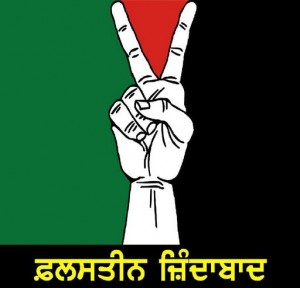 also been killed in this latest escalation of violence in the region. The situation is dire, as Israel is now ramping up for a full on ground invasion of Gaza, an area of only 141 square miles inhabited by 1.7 million residents. One of the most densely populated areas in the world, it has also been called the largest open air prison in the world. (Read Ten things you need to know about Gaza for more).
also been killed in this latest escalation of violence in the region. The situation is dire, as Israel is now ramping up for a full on ground invasion of Gaza, an area of only 141 square miles inhabited by 1.7 million residents. One of the most densely populated areas in the world, it has also been called the largest open air prison in the world. (Read Ten things you need to know about Gaza for more).
Let us be clear: Israel is not defending its citizens. It is on an aggressive, offensive, politically-charged rampage. We must read beyond the deceiving mainstream media coverage to get the to reality of the situation (see this timeline of recent events). This isn’t about Hamas rockets or any dangers to the existence of the state of Israel. Phyllis Bennis wrote in the Nation:
So why the escalation? Israeli military and political leaders have long made clear that regular military attacks to “cleanse” Palestinian territories (the term was used by Israeli soldiers to describe their role in the 2008-09 Israeli assault on Gaza) is part of their long-term strategic plan. Earlier this year, on the third anniversary of the Gaza assault, Israeli army Chief of Staff Lt. Gen. Benny Gantz told Army Radio that Israel will need to attack Gaza again soon, to restore what he called its power of “deterrence.” He said the assault must be “swift and painful,” concluding, “we will act when the conditions are right.” Perhaps this was his chosen moment…
This is primarily about Netanyanu shoring up the right wing of his base. And once again it is Palestinians, this time Gazans, who will pay the price. The question that remains is whether the US-assured impunity that Israel’s leadership has so long counted on will continue, or whether there will be enough pressure on the Obama administration and Congress so that this time, the United States will finally be forced to allow the international community to hold Israel accountable for this latest round of violations of international law.
If you pay taxes in the United States, you are helping fund Israel’s invasion. Just a few months ago, President Obama announced the addition of $70 million in military aid to Israel. We Americans are literally funding the atrocities being committed against our brothers and sisters in Gaza right now.
Guestblogged by Mewa Singh
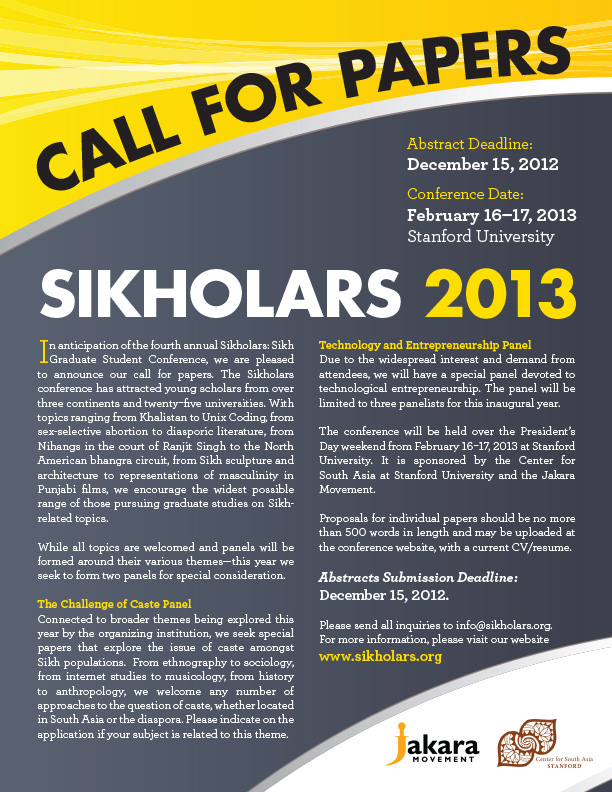 Few events are as anticipated as the annual Sikholars conference, held annually in the Bay Area. Now returning for the fourth year, the event continues to grow, generate new interest, and excite Sikh sangats from the Bay Area and beyond. A showcase for young Sikh scholars and others working on Sikh-related topics, the venue provides an intellectual space for engagement, discussion, and debate.
Few events are as anticipated as the annual Sikholars conference, held annually in the Bay Area. Now returning for the fourth year, the event continues to grow, generate new interest, and excite Sikh sangats from the Bay Area and beyond. A showcase for young Sikh scholars and others working on Sikh-related topics, the venue provides an intellectual space for engagement, discussion, and debate.
The conference has already announced its “call for papers”:
In anticipation of the fourth annual Sikholars: Sikh Graduate Student Conference, we are pleased to announce our call for papers. The Sikholars conference has attracted young scholars from over three continents and twenty–five universities. With topics ranging from Khalistan to Unix Coding, from sex-selective abortion to diasporic literature, from Nihangs in the court of Ranjit Singh to the North American bhangra circuit, from Sikh sculpture and architecture to representations of masculinity in Punjabi films, we encourage the widest possible range of those pursuing graduate studies on Sikh-related topics.
The deadline to apply to present is December 15, 2012.
The event is being hosted by Stanford University’s Center for South Asia and the Jakara Movement.
Co-blogged by Sundari and AmericanTurban
Last week, in the context of the significance of California’s 9th Congressional District to Sikh Americans, we sent the major candidates of California’s 9th Congressional District — incumbent Representative Jerry McNerney and challenger Ricky Gill — a questionnaire to learn more about their positions about Sikh American-related issues (see previous post here). Both candidates responded. However, the nature of the responses received were quite different.
Rep. Jerry McNerney’s campaign responded to the questionnaire and Ricky Gill’s campaign declined to answer. As we had stated in our earlier post, both responses will be printed verbatim and are below.
This past weekend, I attended the second annual Sikh Feminist Conference at the University of British Columbia in Vancouver. A friend posted a concise review of the conference here which I would encourage you to read. I’ll just reiterate two points made – the first being the discussion around whether the western concept of Feminism fits within Sikhi. What does it mean to call oneself a Sikh Feminist or even a Male Sikh Feminist? Many participants at the conference felt the words “Sikh” and “Feminist” were redundant and that it was not necessary for us to try to mold to western definitions of feminism when our own faith clearly defines the concept of [gender] equality. On the other hand, others argued that the word is powerful enough to raise and question the issue of patriarchy that continues to exist within the community. The discussion reminded me of a similar conversation that was had at the Faith and Feminism panel, featuring Sikh women, which took place last year in NYC. About the panel discussion, the author writes,
The core values in Sikhism, particularly the human rights element, were what informed [the panelist’s] views on issues, including women’s rights. She has taken the word “feminism” out of the equation, and transplanted the values of it back into Sikhi, and reminded us that anyone who adheres to the principles of Sikhism and to the words of the Guru Granth Sahib has many labels, feminist, humanist, and activist are just some of them.
The second point is the important link between theory and practice within the Sikh community. I want to highlight this in two ways. The first being that while it has been established that the Gurus emphasized living in an eco-friendly way, it’s clear that as a community we are still working to close the gap – from melas to gurdwaras to within our own homes – our practice of living in an eco-friendly way could use some improvement. EcoSikh sponsored the Sikh Feminist conference and it’s presence was felt very thoughtfully throughout the day (biodegradable utensils, compost, recycling etc!) and it was inspiring to see our community not just talk about it in theory, but actually put it into practice.
Another discussion was around the concept of izzat or honor, whether it impacts both men and women, how it manifests differently for men and women and why it continues to be a topic of discussion when theoretically, our Gurus gave us the guidance and tools to live in an egalitarian society. The concept itself has been one of discussion on our blog too – particularly around what it means to a family and to a community. We are once again reminded of this issue with the recent news of Baljinder Kaur, a pregnant woman from Yuba City who was arrested over the weekend, just before the Sikh Women’s conference, for apparently killing her mother-in-law.
Co-blogged by Sundari and AmericanTurban
 Of recent and recurring discussion on The Langar Hall and American Turban has been the election race in California’s 9th Congressional District. For Sikh Americans, this district’s race is significant.Located in northern California, the 9th Congressional District contains America’s oldest and one of its largest Sikh American communities. The oldest Gurdwara in the United States (which only a couple of weeks ago celebrated its centennial anniversary) is located in this District in Stockton, California. America’s first Asian American and Sikh American member of Congress, Dalip Singh Saund, once resided in this area, and one of the candidates currently running is himself a Sikh American.Given the unique character of the District, we are interested to know the thoughts of the main candidates of the district on the issues affecting their current and potential Sikh American constituents, many of whom have been active in supporting each of the candidates. It is our plan to publish these answers by each candidate to learn more about their positions on issues affecting Sikh Americans.With election day in the US nearing, we have asked the main candidates — incumbent Representative Jerry McNerney and Republican challenger Ricky Gill — to offer their thoughts on Sikh American issues. We are aware that important concerns of the general public on issues like jobs, healthcare, or social issues are often already asked of the candidates, but that their positions on Sikh American issues are not asked of them. Accordingly, these questions reflect Sikh American concerns that do not get the same attention from mainstream media.
Of recent and recurring discussion on The Langar Hall and American Turban has been the election race in California’s 9th Congressional District. For Sikh Americans, this district’s race is significant.Located in northern California, the 9th Congressional District contains America’s oldest and one of its largest Sikh American communities. The oldest Gurdwara in the United States (which only a couple of weeks ago celebrated its centennial anniversary) is located in this District in Stockton, California. America’s first Asian American and Sikh American member of Congress, Dalip Singh Saund, once resided in this area, and one of the candidates currently running is himself a Sikh American.Given the unique character of the District, we are interested to know the thoughts of the main candidates of the district on the issues affecting their current and potential Sikh American constituents, many of whom have been active in supporting each of the candidates. It is our plan to publish these answers by each candidate to learn more about their positions on issues affecting Sikh Americans.With election day in the US nearing, we have asked the main candidates — incumbent Representative Jerry McNerney and Republican challenger Ricky Gill — to offer their thoughts on Sikh American issues. We are aware that important concerns of the general public on issues like jobs, healthcare, or social issues are often already asked of the candidates, but that their positions on Sikh American issues are not asked of them. Accordingly, these questions reflect Sikh American concerns that do not get the same attention from mainstream media.The questions that we have sent to the campaigns of Jerry McNerney and Ricky Gill are below the fold, and on Tuesday, October 30, we will publish the responses from each campaign.
Guest blogged by Simran Jeet Singh
This past week, I visited a liberal arts college in Pennsylvania to introduce undergraduate students to the Sikh experience in America. I was pleasantly surprised to see that the professor had assigned Naunihal Singh’s piece from the New Yorker – “An American Tragedy” – one of the most insightful and well-written pieces published in the immediate aftermath of Oak Creek.
The professor had asked the students to submit short reflections on the shooting, and in reviewing their essays, I was struck by the consistent refrain that we have heard all too often: “If Wade Michael Page had only known that he was attacking Sikhs instead of Muslims…”
In other forums, I have discussed some problems with the framework of “mistaken identity,” including the implication of a “correct identity” to be targeted, the displacement of accountability, and the freezing of hate-violence within particular moments of time.
While I still stand by these arguments, I think there is a much more fundamental problem in our application of this idea to the shooting at the gurdwara in Oak Creek. We do not yet know Page’s specific intentions, yet we continue to assume that he actually intended to attack Muslims. For some reason, we have not seriously entertained the possibility that Page entered the gurdwara fully intending to kill Sikhs.
“While Sikh American women do a lions-share of organizing and executing the business of the Sikh community, their experiences of faith, family, and community are under-represented in art, literature, and scholarship. In fact, the experience and image of a Sikh woman is obsolete and – in most cases – invisible in the North American milieu. The modern landscapes and political and social influences that shape Sikh women’s lives as well as the subsequent paths they take have yet to be understood, documented, shared and absorbed by our cultural psyche.”
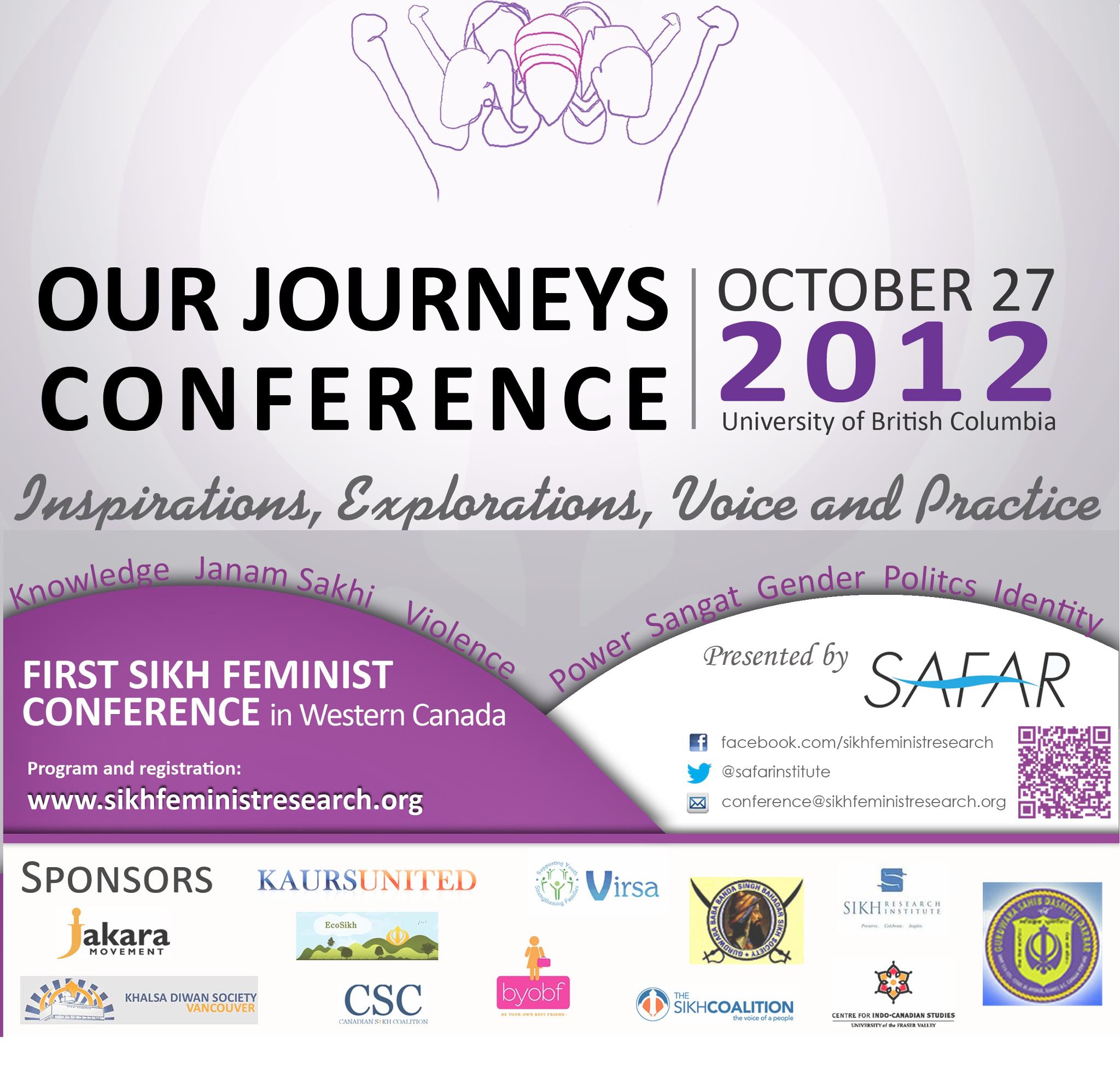 The above description is an excerpt from the “Sikh American Women and Their Love Stories Collection” presentation that will be taking place at this year’s Our Journeys conference, hosted by the Sikh Feminists Research Institute on October 27th. This conference series, the first of its kind, provides a platform to explore the intersections of Sikhi and gender. The goal is to promote research around Sikh feminist issues, heighten participation in critical discourse, promote alliance building and develop partnerships between academic and community organizations.
The above description is an excerpt from the “Sikh American Women and Their Love Stories Collection” presentation that will be taking place at this year’s Our Journeys conference, hosted by the Sikh Feminists Research Institute on October 27th. This conference series, the first of its kind, provides a platform to explore the intersections of Sikhi and gender. The goal is to promote research around Sikh feminist issues, heighten participation in critical discourse, promote alliance building and develop partnerships between academic and community organizations.
Often times, conversations about Sikhs, Sikh issues and the Sikh identity start and end with the Sikh male identity. While this conversation is acutely relevant in the climate of ignorance and discrimination that we live in, it’s also critical that we have conversations that include, are about, and are led by Sikh women.
Having attended last year’s inaugural conference, I look forward to engaging once again in a conversation around women’s issues within the Punjabi/Sikh framework. It’s exciting that we have a platform to celebrate the growth and development of the Sikh feminist voice.
Guestblogged by Mewa Singh
Applications are out and will soon be due. Need some assistance? Then here is a service for you!
Here are the Top 5 Reasons You should Use the Jakara Movement’s Sikhiya Service:
- Save money – there are a number of professional services on the market that provide personal statement assistance and help. Websites like accepted.com charge in the thousands of dollars for this type of service. You’re getting it for free!
- Expert Help – Get help from other Sikhs that have successfully already gone through the process. They will edit your writing and share admission tips.
- Fast Turnaround – Most drafts are sent back within 48 hours. Can’t get much faster than that!
- Confidential – Confidentiality is completely respected. After you upload your draft, your name and other personal information is removed before being sent to the editors. All editors also sign confidentiality notes to respect the privacy of you and your writing.
- Pay It Forward – The idea of this type of seva works through the principle of ‘pay it forward.’ Just as you will be using the service today, the hope is that you will provide this service for another young Sikh in the future.
A number of Sikhs have already taken advantage of the Sikhiya program, part of Jakara Movement’s Sikholars initiative.
This weekend, from Friday to Sunday October 19-21st, the Sikh Studies department at Hofstra University will host ‘Sikhi(sm), Literature and Film,’ a conference on literary and visual cultures in the Sikh tradition, both in Panjab and the Diaspora.
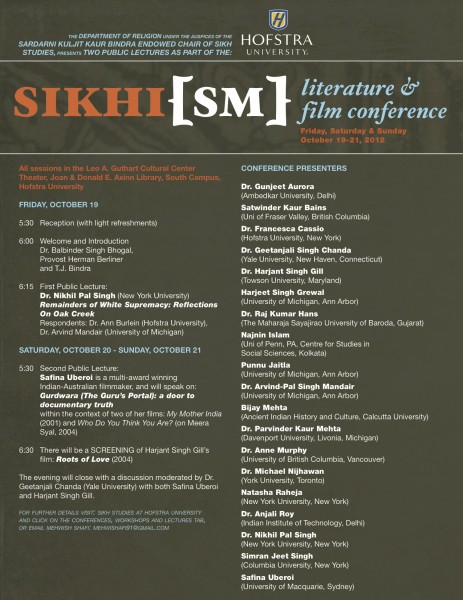 Paper presentations will be given during five sessions, with presentations ranging from de-categorizing the janamsakhis to the poetry of Puran Singh, discourses on secularism to literary representations of Sikhs, Sikh masculine identity vis-à-vis kesh and the dastaar to Panjabi theater, Museum exhibitions to Sikh identity in film and Bollywood, Hip Hop and rap as expressive forms among Panjabi youth to Gurbani sangeet and female kirtaniya. Presentation topics and bios can be accessed via the Sikh Studies website at Hofstra.
Paper presentations will be given during five sessions, with presentations ranging from de-categorizing the janamsakhis to the poetry of Puran Singh, discourses on secularism to literary representations of Sikhs, Sikh masculine identity vis-à-vis kesh and the dastaar to Panjabi theater, Museum exhibitions to Sikh identity in film and Bollywood, Hip Hop and rap as expressive forms among Panjabi youth to Gurbani sangeet and female kirtaniya. Presentation topics and bios can be accessed via the Sikh Studies website at Hofstra.
This year the conference will also host two supplementary film screenings and offer a forum to deepen the discourse around the recent Oak Creek Massacre. The films include Safina Uberoi’s ‘Gurdwara: the Guru’s Portal: a door to document Truth’ and Harjant Gill’s ‘Roots of Love,’ while the pieces related to Oak Creek include Dr. Nikhil Pal Singh’s ‘Remainders of White Supremacy,’ and Dr. Balbinder Singh Bhogal’s ‘Oak Creek Killings: The Denial of a culture of oppression’ (which can be read online).
Guest blog by: Rocco
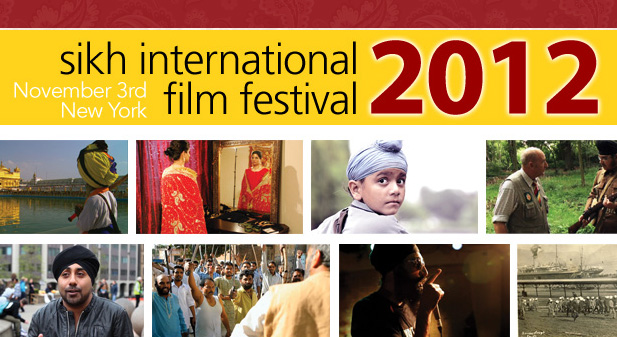 One of the highlights of fall in NYC is the Sikh Arts and Film Festival which showcases the story of our community via films and is being held November 2-3, 2012. Along with that is a Heritage Gala which is being held November 3, 2012 “to celebrate the rich heritage, culture and traditions of the Sikhs.” In the past dignitaries and business leaders have been selected as Chief Guest and Guest of Honors. Unfortunately, The Chief Guest this year is Nirupama Rao, India’s Ambassador to the United States and the Guest of Honors include Prabhu Dayal, Consul General India, New York and Hardeep Puri, India’s Permanent Representative to the United Nations.
One of the highlights of fall in NYC is the Sikh Arts and Film Festival which showcases the story of our community via films and is being held November 2-3, 2012. Along with that is a Heritage Gala which is being held November 3, 2012 “to celebrate the rich heritage, culture and traditions of the Sikhs.” In the past dignitaries and business leaders have been selected as Chief Guest and Guest of Honors. Unfortunately, The Chief Guest this year is Nirupama Rao, India’s Ambassador to the United States and the Guest of Honors include Prabhu Dayal, Consul General India, New York and Hardeep Puri, India’s Permanent Representative to the United Nations.
For some, Sikhs having Indian Government representatives as honorees poses no conflict and should be encouraged. One may argue that the attack on Darbar Sahib and Genocide in 1984 are distant events that occurred twenty eight years ago and should be forgotten. One may argue that the civil war which ensued for ten years afterwards in Panjab and led to the death of the tens of thousands of Sikh youth were collateral damage and justifiable in order to preserve the unity of India. One may argue that that struggle for an independent Panjab has reached its nadir and it’s important to “re-Indianize” ourselves and take advantage of the current economic environment.

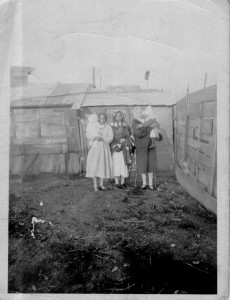 Mill Town Pioneers. Most of Canada’s early Sikh immigrants found work in lumber mills throughout the Pacific Northwest.
Mill Town Pioneers. Most of Canada’s early Sikh immigrants found work in lumber mills throughout the Pacific Northwest.